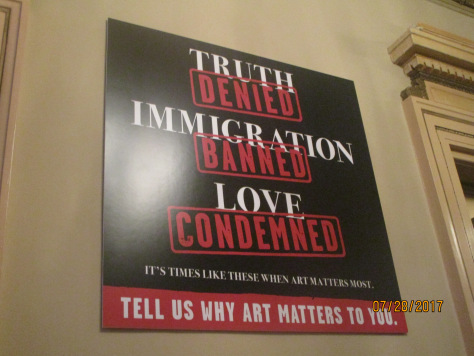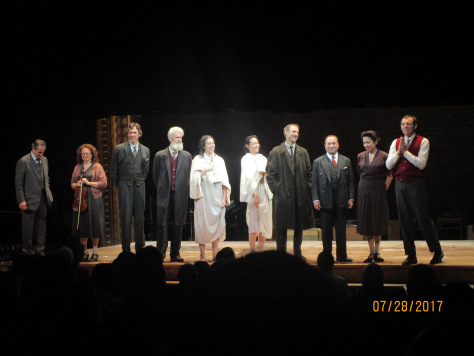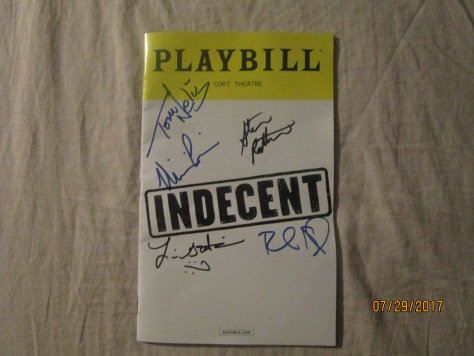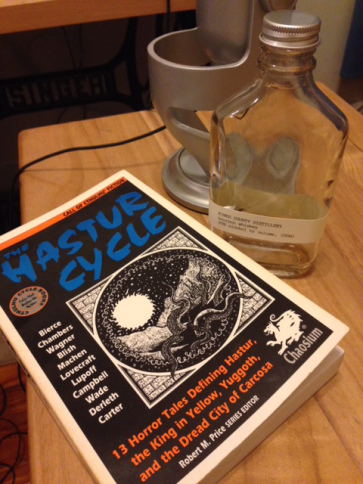
Despite the play’s title, Indecent, written by Paula Vogel, is about the purity of the Arts, and the struggle to maintain its integrity in the face of intolerance. Issues of antisemitism, homophobia and censorship in the midst of political and social uncertainty resonate throughout the play, and are as relevant in 2017 as they were in 1923, when much of the play takes place. I’m not as frequent a playgoer as I probably should be, as I tend to gravitate towards musicals (in fact, this is the first Broadway play I’ve seen this year thus far, as my fixation on Sunset Blvd. commandeered my theater going attention for the entirety of its limited run), the word of mouth about Indecent piqued my interest, along with my ongoing endeavor to expand my theatrical experiences.

This experience far exceeded that objective.
The play recounts the controversy surrounding God of Vengeance written by Sholem Asch in 1907, set in a brothel which included a love scene between two women. While popular and accepted across Europe, its Broadway run in 1923 had been deemed obscene, with all those involved with the production arrested and convicted of obscenity. The play runs under two hours (with no intermission), yet the events within span over several decades across Europe and America, telling the impact one play had within world history.

The overall set design is sparse, with the cast initially seated on the stage, with a trio of musicians – violin, clarinet and accordion – among the actors. Music is interwoven into the play, as underscoring and as commentary to the events unfolding, which enhance the tension. There are projected stage directions that impart to the audience the passage of time to give context to the scenes, both in English and Yiddish, the original language in which God of Vengeance was written. The framework of Indecent starts off as a play within a play, with Lemml, the stage manager, introducing the cast and setting the scene; the projected narration takes over, and the cast inhabit the role of the actors playing the play within the play. There is a raised platform in the middle of the stage on which the actors depict the play, with the surrounding area of the stage acting as the backstage area. The cast is astounding as a whole, imparting humor and anger with equal passion, as conflict over art and acceptance is debated. Language plays an important role as well – while the bulk of the play is spoken in English, the narrative projections tell in which language the characters are speaking, and the cast adjusted accordingly.

The stage door experience was low key, as not too many people gathered to meet the actors, which was a blessing, as those who waited were able to chat with the actors (or in my case babble quasi-inarticulately, as the conclusion of the play boggled my mind – in a good way) while signing playbills.
The impact of this play will haunt me for days (and weeks) to come, as a gamut of emotions played within me like a symphony: there were moments of levity, outrage and ultimately sadness, as tears fell uncontrollably as the “blinks in time” passed. I was not the only one – several people around me were equally moved. That oft-used saying that “those who do not learn from history are doomed to repeat it” (I think that’s how the quote goes) rings true, as current events show that there are some who don’t (or refuse to) learn from history.
Change can only happen if people learn to embrace differences, to unlearn the stereotypes imparted by generations that came before them and to accept the fact that there is infinite complexity in the human race.
Indecent had announced its closing date of June 25, 2017, but word of mouth about the play allowed its run to extend to August 6, 2017. I highly recommend seeing this play, as it is a worthwhile examination of why Art Matters more than ever.
 .
.
Advertisements Share this:





